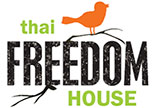Language and Arts Center: Languages
Coordinator: Lisa Nesser
Support staff/ volunteer: We rely heavily on volunteers from Thailand, Burma and foreign countries to teach their native languages. We have teacher training for them included in their volunteer orientation. The Thai volunteers are regular and long term, as are the Shan and Burmese, but the English language teachers fluctuate regularly.
Mission
To give our students essential life skills through languages that help them to connect to the world around them, access their rights in Thailand, add to their job skills and connect them to their culture.
Target Group
Our target group is focused on children and adults 8 years old and up that have not had access to formal education They may be completely illiterate or have very basic language skills. 50 people attend these classes every day at our on-site learning center.
Objectives
1 Thai Freedom House offers languages that our community members need to know, and those they would like to know for a variety of reasons. Most choose 2 or 3 of these classes per week.
2 Thai (2 levels)
It is very important for our community members to learn Thai, as they are living in a country where they are not afforded basic human rights and freedom of movement. Speaking the language can empower them to deal with the police and military in precarious situations, will help them negotiate for themselves at work, and will assist them with any health issues by giving them the confidence to reach out and seek medical advice and support when they are suffering. They can now fill out their own immigration forms instead of paying a Thai official to give what might be incorrect information..
Beyond the practical reasons that we understand well, learning Thai helps them to become better members of society, moving with more confidence. In the upper level class we teach debating and public speaking to help boost self esteem, problem solving skills and articulation. They also learn the basics of social science and have project based workshops to provide other primary level educational experiences.
3 English (2-3 levels)
English is the language of money here in Thailand. Tourism is the main economy here, and to get a better job it is necessary to speak English. It also allows easier online access, and the possibility to contribute to the wider world, share their story in their own words and access the wealth of information online in English.
If students are interested in furthering their studies, we provide one on one or small group tutoring to prepare them to enter a GED program so that they can get secondary school equivalency accreditation and continue to university locally and sometimes abroad. See: Higher Education Project
4 Shan (2 levels)
It was illegal until 2015 to teach Shan language in Burma. So while most of our community members could speak it, none could read and write it. Now everyone in the community can read and write it, including several who are not native Shan speakers and are interested in their peers’ culture.
The success of this program has been huge, as our members now have a sense of pride in their language and Shan culture. If they go back to Burma, they now have confidence to speak to their relatives in Shan. Before, most of the children would be shy to say they are Shan. They would identify themselves as Thai, and speak Thai, for fear of discrimination. They now proudly call themselves Shan and are happy to see others learn their language and perform cultural shows of their traditional costumes and dance.
5 Burmese (2 levels)
For the same reasons as learning Thai in Thailand, our members learn Burmese for when they go back to Burma. It is the official language of the military and police in Burma, and is useful for avoiding exploitation when they return. Our members were often treated very badly in Burma, and so for years they didn’t want to learn the ‘language of the oppressor.’ Around 5 years ago our members decided that they didn’t want to be treated in Burma like they are in Thailand, and so asked for Burmese lessons.
6 Mandarin Chinese
Chinese is spoken a lot in Burma, and there is a huge influx of Chinese tourists to both Burma and Thailand, therefore, it is almost, if not more in some instances, as useful as learning to speak English. In Shan state, where most of our members are from, most signs are also written in Chinese, and people speak either Shan or Chinese, not Burmese. For these reasons, our students are very enthusiastic about learning Mandarin.
7 Teacher Training
All the teachers of these languages are volunteers, from our International or local volunteer program or Thai Freedom House’s own students, giving something back to the organisation that helped them. We provide a language teacher training program for our members who wish to become teachers, following the path to become social workers or to do further community development. The training allows them to develop skills in creative problem solving, group work, pair dialogue, and to become leaders and role models in their community.
8 Community Responsibility
The language classes and weekly arts class are scheduled between 5pm and 8pm every night. There is a 15 min break halfway through for a healthy snack and herbal juice provided by us.
The students have the responsibility to go downstairs and get the juice and snacks that have been prepared, and the cups and plates. After the break, a different set of students take the dishes downstairs, cleans up and put the dishes away. This is a small thing but encourages the students to take responsibility for their learning space.
After class they tidy the room, put the cushions away and sweep the floor. The students all have to be downstairs at 8pm, as most of their parents come quickly to collect them, before returning to work.
Ongoing/Current needs
We heavily rely on volunteers to teach these classes, both from Western countries and locals and even our own students. We also rely on donations for supplies and materials for the classroom, including technology and teaching resources.
Funds for teacher trainings, allowing us to provide a small stipend to local volunteers is desperately needed.
Budget
Currently we have no budget for this program. It shares the donated, limited resources in the classroom and office.
Future Projects/Aspirations
This project is the core of our organization, Thai Freedom House. Through it, all of the other projects find their way to support the learning and growth of our students, community and organization. We would like to hire two more permanent staff from our community of students, train them to work in the office environment and gain experience working in an International office setting in a public service and education based model of community development. Most of them aspire to return to Burma in the future so this experience will be helping to build a more sustainable, aware and educated Burma.
We will choose two of the highest risk students who are currently working in jobs that are not paying fairly and are not using their skills to the best of their abilities. We would like to train them from the bottom up, providing them with job skills and also accessing their unique viewpoint and language skills as members of the community that we serve. This requires long term, guaranteed salary support for those two members as well as the other two positions currently held, that of our Executive Director and a paid Intern whom currently manage all of our projects.

